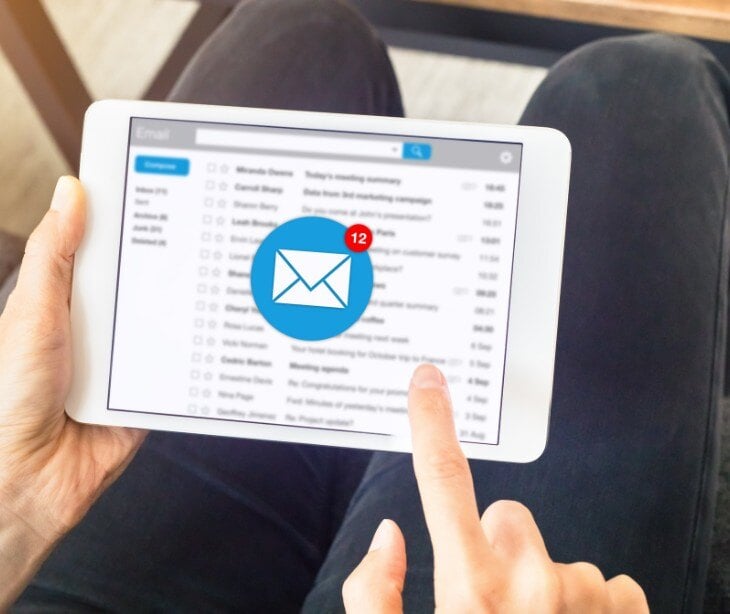4 min read
The implications of non-HIPAA compliant communication in healthcare
Farah Amod
Jan 31, 2025 2:03:34 PM

The consequences of not following HIPAA guidelines in healthcare communication can be serious and wide-ranging. Healthcare providers risk facing fines, criminal charges, damage to their reputation, and even patient lawsuits. Implementing HIPAA compliant communication practices protects patient privacy and helps avoid costly penalties.
Understanding HIPAA and its communication standards
HIPAA requires healthcare providers, insurers, and business associates to safeguard the confidentiality, integrity, and availability of electronic protected health information (ePHI). The HIPAA privacy and security rules outline specific standards for securely transmitting and storing ePHI to protect patient privacy.
Communications involving ePHI—whether through email, text messages, or telehealth platforms—must use safeguards like encryption and access controls to prevent unauthorized access. Failure to comply with these requirements can lead to serious consequences, including hefty fines and even criminal charges.
The privacy rule and security rule (45 CFR Part 160 and Subparts A, C, and E of Part 164) serve as the foundation of HIPAA, establishing clear guidelines to ensure sensitive healthcare information is shared and managed securely.
The legal consequences of non-HIPAA compliant communication
Healthcare providers that fail to comply with HIPAA’s communication standards face various legal penalties, including:
Civil penalties
The Department of Health and Human Services (HHS) Office for Civil Rights (OCR) enforces HIPAA compliance. The OCR can impose civil penalties for violations based on the level of negligence, with fines ranging from $100 to $50,000 per violation or per record, up to an annual maximum of $1.5 million. The fines are categorized into four tiers:
- Tier 1: Lack of knowledge of the violation ($100 to $50,000 per violation)
- Tier 2: Reasonable cause, but not willful neglect ($1,000 to $50,000 per violation)
- Tier 3: Willful neglect, corrected within 30 days ($10,000 to $50,000 per violation)
- Tier 4: Willful neglect, not corrected within 30 days ($50,000 per violation)
In December 2024, Children’s Hospital Colorado was fined $548,265 for multiple HIPAA violations following two data breaches in 2017 and 2020. Both breaches stemmed from unsecured email practices, including phishing attacks that exposed the protected health information (PHI) of over 14,000 individuals. The breaches indicated failures such as the lack of multifactor authentication, inadequate staff training to recognize phishing attempts, and a failure to conduct regular risk analyses, all of which left email communications vulnerable to unauthorized access.
Criminal penalties
In addition to civil penalties, HIPAA violations can result in criminal charges. The Department of Justice (DOJ) handles criminal cases, which can lead to fines and imprisonment. Criminal penalties are categorized into three tiers based on intent:
- Tier 1: Negligent disclosure of ePHI (up to $50,000 fine and one year in prison)
- Tier 2: Disclosure under false pretenses (up to $100,000 fine and five years in prison)
- Tier 3: Disclosure for malicious intent or financial gain (up to $250,000 fine and ten years in prison)
Civil lawsuits from patients
Although HIPAA itself does not provide a private right of action for patients to sue healthcare providers, patients can still file civil lawsuits under state laws if their privacy rights are violated due to non-HIPAA compliant communication. For example, if a provider’s negligent communication practices lead to a data breach, affected patients may sue for damages under negligence or breach of contract claims.
In a class-action lawsuit against Anthem Inc., patients filed claims after a massive data breach exposed the personal information of nearly 80 million individuals. While the settlement terms were not solely based on HIPAA violations, the breach proved the benefits of maintaining HIPAA compliant communication to avoid legal liabilities.
Go deeper:
Impact on reputation and patient trust
Beyond financial penalties and legal repercussions, non-HIPAA compliant communication can severely damage a healthcare organization’s reputation. Patients expect their sensitive health information to be protected, and any breach of trust can lead to loss of patients and negative publicity.
A 2021 survey conducted by Semafone found that 66% of consumers would leave a healthcare provider if their payment or personal information was compromised in a data breach due to the provider's lack of security measures. The loss of patient trust can have long-term consequences, affecting patient retention and the organization’s ability to attract new patients.
Common non-compliant communication practices
Some common practices that can lead to non-HIPAA compliant communication include:
- Using personal email accounts: Sending patient information through personal email accounts that lack encryption can expose ePHI to unauthorized access.
- Unsecured text messaging: Texting patient information without using a secure messaging app can lead to unauthorized interception of ePHI.
- Lack of encryption: Sending ePHI via email without encryption puts the data at risk of being intercepted by cybercriminals.
- Inadequate access controls: Allowing employees to access ePHI without proper access controls can result in unauthorized disclosures.
The Paubox solution
Paubox Texting and Paubox Email Suite are secure communication tools designed to help healthcare organizations uphold HIPAA compliance. Paubox Texting provides a HIPAA compliant platform for sending encrypted text messages to patients, ensuring that protected health information (PHI) is transmitted securely and remains confidential.
The Paubox Email Suite offers encrypted email services that automatically secure all outgoing messages, eliminating the need for patient portals or encryption keys. This solution ensures sensitive information is protected from unauthorized access while remaining user-friendly for both healthcare providers and patients.
Together, these services support organizations in meeting HIPAA's security standards while facilitating efficient and secure communication.
Learn more: HIPAA Compliant Email: The Definitive Guide
FAQs
What is the HIPAA method of communication?
There is no specific HIPAA method of communication but there are HIPAA compliant methods of communication such as HIPAA compliant email.
How can smaller healthcare practices ensure HIPAA compliance with limited resources?
Smaller practices can adopt cost-effective HIPAA compliant tools, such as secure email platforms or encrypted messaging apps. Partnering with third-party vendors that specialize in HIPAA compliance and providing staff with regular training can also help mitigate risks without straining resources.
How can healthcare providers educate patients about secure communication methods?
Providers can share simple guides or hold informational sessions to explain the benefits of secure communication. They can also introduce patients to HIPAA compliant tools, such as secure email, and demonstrate how these protect their sensitive information.




%20-%202024-09-20T062025.637.jpg)